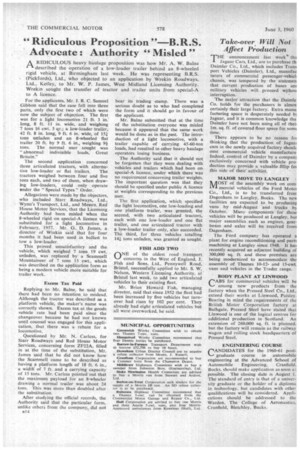"Ridiculous Proposition " B.R.S.
Page 48

If you've noticed an error in this article please click here to report it so we can fix it.
Advocate : Authority "Misled" A RIDICULOUS heavy haulage proposition was how Mr. A. W. Balne " described the operation of a low-loader trailer behind an 8-wheeled rigid vehicle, at Birmingham last week. He was representing B.R.S. (Pickfords), Ltd., who objected to an application by Wrekin Roadways, Ltd., Ketley, to Mr. W. P. James, West Midland Licensing Authority. Wrekin sought the transfer of tractor and trailer units from special-A to A licence.
For the applicants. Mr. J. R. C. Samuel Gibbon said that the case fell into three parts, only the first two of which were now the subject of objection. The first was for a light locomotive 21 ft. 3 in: long, 8 ft. 11 in. wide, and weighing 7 tons 16 cwt. 3 qr.; a low-loader trailer,. 42 ft. 8 in. long, 9 ft. 6 in. wide, of 151. tons unladen and an 8-wheeled flat trailer 20 ft. by 9 ft. 6 in., weighing 91 tons. The normal user sought was "abnormal indivisible loads, Great Britain."
The second application concerned three articulated tractors, with alterna tive low-loader or fiat trailers. The tractors weighed between four and five tons each, and two of them, when drawing low-loaders, could only operate under the "Special Types" Order.
Allegations were made by the objectors, who included Starr Roadways, Ltd., Wynn's Transport, Ltd., and Messrs. Red House Motor Services, that the Licensing Authority had been misled when the 8-wheeled rigid on special-A licence was substituted for a light locomotive in February, 1957. Mr. G. D. James, a director of Wrekin said that for four months it had beep used in ballast to tow a low-loader.
This proved unsatisfactory and the vehicle, which weighed 7 tons 19 cwt. unladen, was replaced by a Scammell Mountaineer of 7 tons 13 cwt., which was described on the application form as being a modern vehicle more suitable for trailer work.
Excess Tax Paid Replying to Mr. Balne, he said that there had been no intention to mislead. Although the tractor was described as a platform vehicle, the maker's name was correctly shown. Excess tax at the goods vehicle rate had been paid since the changeover because he had not known until counsel was engaged for this application, that there was a rebate for a locomotive, ,
Questioned by Mr. N. Carless, for Starr Roadways and Red House Motor Services, concerning form ZE22A, filled in at the time of the substitution, Mr. James said that he did not know how the Scammeil came to be described as having a platform length of 18 ft. 6 in., a width' of 7 ft. and a carrying capacity of 15 tons. Mr. Carless pointed out that the maximum payload for an 8-wheeler drawing a normal trailer was about 24 tons. This was more than doubled after the substitution.
After studying the official records. the Authority said that the particular form, unlike others from the company, did not al4 bear its trading stamp. There was a serious doubt as to who had completed the form and it should go in favour of the applicant.
Mr. Balne submitted that at the time of the substitution everyone was misled because it appeared that the same work would be done as in the past. The introduction of a light locomotive, with a trailer capable of carrying 45-60-ton loads, had resulted in other heavy haulage operators losing business.
The Authority said that it should not be forgotten that they were, dealing with vehicles and trailers which had been on special-A licence, under which there was no requirement concerning trailer weights. The important question was that they should be specified under public A licence at weights corresponding to the previous user.
The first application, which specified the light locomotive, one low-loading and one platform trailer, was granted, the second, with two articulated tractors, each with one low-loader and one flat trailer, and one articulated tractor with a low-loader trailer only, also succeeded. The third, for three vehicles totalling 141 tons unladen, as granted as sought.
ONE of the oldest road transport concerns in the West of England, J. Fish and Sons, Ltd., Pennywell Road, -Bristol, successfully applied to Mr. S. W. Nelson, Western Licensing Authority, at Bristol last week, to add two articulated vehicles to their existing fleet.
Mr. Brian Howard Fish, managing director, said that since 1952 the fleet had been increased by five vehicles but turnover had risen by 102 per cent. They already had eight articulated vehicles but all were overworked, he said. FISH ADD TWO
















































































































